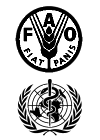
Working Groups
Electronic Working Groups
Working Groups play an essential role in the process of standard setting. Proposals for the elaboration of Codex standards can come from a Committee, but Members and Observers are responsible for the underlying activities. The Committee will ask which Member State(s) is willing to chair a Working Group that will draft the text. Then it is asked which Member States and Observers are willing to join that Working Group. So, the standard is made in a Working Group with representatives of Members and Observers of the Codex Alimentarius, and chaired also by a Member.
In former days, working groups could have physical meetings to discuss on a proposal and to develop a draft text. Nowadays the Working Groups are Electronic Working Groups, meaning that the members of the group communicate and work through electronic channels such as e-mail and online storage systems. In the Procedural Manual one can find the Codex Guidelines on Electronic Working Groups.
The documents that are developed by an EWG are distributed by the Codex Secretariat, for discussion in the forthcoming Committee meeting, following the Step Procedure. The draft is included in the meetings Agenda and is then open for comments of the Members and Observers (including those in the EWG). In most Committees the Committees Chair will ask the Chair of the EWG to shortly introduce the document before starting the discussion. Comments are noted and added to the Report of the Committee. This includes the new status of the draft, e.g. to keep the draft at Step 3 to be redrafted for comments, or to send it for finalization to the Commission (Step 8).
Chairing or joining an EWG
If a new or updated standard is relevant for your country (e.g. related to a product that is produced in your place and exported in substantial quantities) it can be wise to be heavily involved in the standard setting, e.g. to chair that EWG. In this way you can prepare a draft that is well suited for your regional or national situation. For importing countries joining an EWG is less relevant, as you can comment on the draft during the Committee meetings. So, the question if it is in your interest to chair a working group or to join the group heavily depends on your situation in relation to the topic. So an analysis on your tactics on joining or chairing in advance might be very useful.
When chairing or joining an EWG there are some methods to have control on the proposal and on the manner it is presented to the Members and Observers. You could consider to seek support from an expert if you need for a new or updated Codex standard. In that case you might think about getting in contact with the author of this website, who has been active as a Chair of EWGs and in participanting in EWGs. He is willing and experienced in the development of trainings on chairing or joining a Codex Working Group that might help you to achieve your goals.
